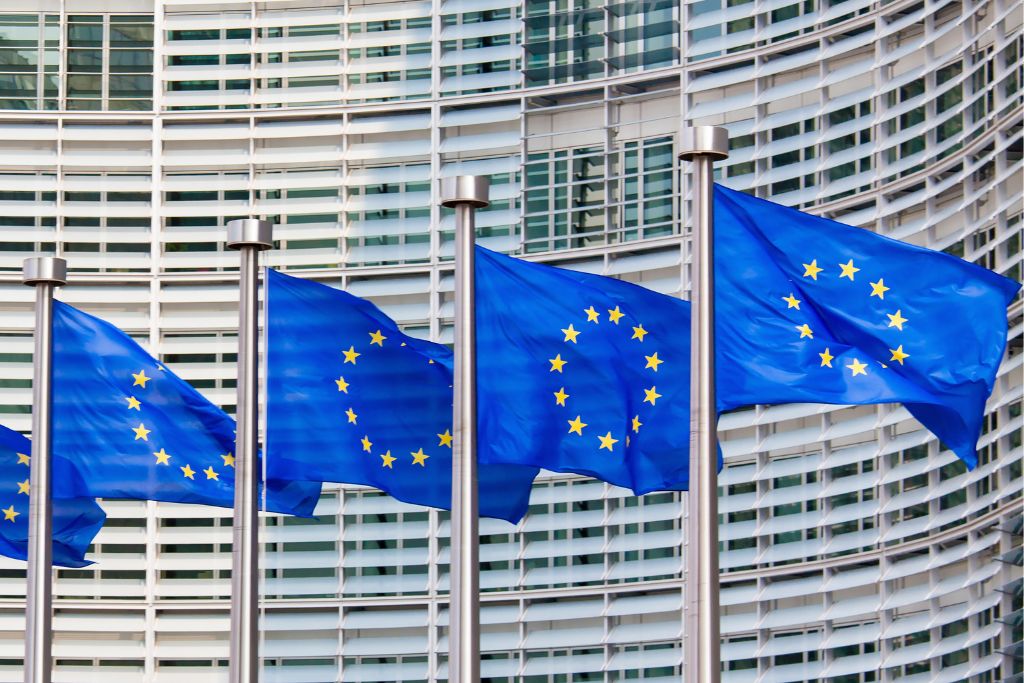The new regulations on packaging waste and carbon removals are crucial to the bloc’s green goals, including net zero emissions by 2050, EU Commission says.
—
The European Union set out highly-anticipated, EU-wide rules for packaging waste and proposed new a new plan to certify carbon removal projects, which campaigners worry could create opportunities for greenwashing.
Packaging Waste
Packaging waste currently accounts for 36% of municipal solid waste. According to EU data, each European generates on average about 180 kilograms (397 pounds) of packaging waste per year. Under the European Commission’s proposal, all 27 member states will be required to cut packaging waste per capita by 15% by 2040 from 2018 levels.
The planned legislation also sets targets for recycled content in plastic packaging. Drinks bottles, for example, will have to have at least 30% recyclable material by 2030 and 65% by 2040. Other types of plastic packaging – including coffee pods, tea bags, and labels for fresh produce – will need to be compostable. The new requirements will help make packaging fully recyclable by 2030, the Commission says.
Moreover, the EU seeks to expand the list of banned single-use plastics – which currently includes single-use plastic plates, cutlery, straws, balloon sticks and cotton buds – to bags and nets used to wrap food in grocery stores and cafes as well as small-sized shampoo and other beauty products distributed at hotels.
Bloc members will also be required to set up a deposit return system for plastic bottles and cans. 10 European countries have so far implemented deposit refund schemes, with return rates ranging between 82% in Estonia and 97% to 98.4% in Norway and Germany.
The proposal is likely to be revised and will need to be approved by the European Parliament and EU governments in order to become law.
???? Waste no more.
A packaging waste solution is here – with our new proposals to:
???? prevent the generation of new waste,
???? boosting reuse and refill of packaging,
???? make all packaging recyclable by 2030.Our #EUDataCrunch reflects this shift to #CircularEconomy
— European Commission ???????? (@EU_Commission) November 30, 2022
You might also like: 8 Sustainable Packaging Solutions to Solve the Plastic Waste Dilemma
Carbon Removal Projects
On Wednesday, the European Commission adopted a proposal for the bloc’s first framework to certify high-quality carbon removal projects, though key details will be worked out at a later point.
Removals include carbon stored in forests and soil as well as carbon dioxide trapped in the atmosphere. Projects will have to meet certain criteria to win EU approval, including transparency to prevent greenwashing, quantification of the climate benefits that such projects would bring, as well as rules on the duration of carbon storage.
“The proposed regulation will significantly improve the EU’s capacity to quantify, monitor and verify carbon removals,” the Commission said in a press release. “Higher transparency will ensure trust from stakeholders and industry, and prevent greenwashing. Carbon removals can and must bring clear benefits for the climate, and the Commission will prioritise those carbon removal activities which will provide significant benefits for biodiversity.”
Wednesday’s proposal represents an important step forward for the European Green Deal, the bloc’s long-term growth strategy to make Europe climate-neutral by 2050. However, the exact requirements to obtain tailored certification have not been revealed and discussions are not expected to take place until at least the first quarter of 2023.
You might also like: Is Carbon Offset a Form of Greenwashing?


















